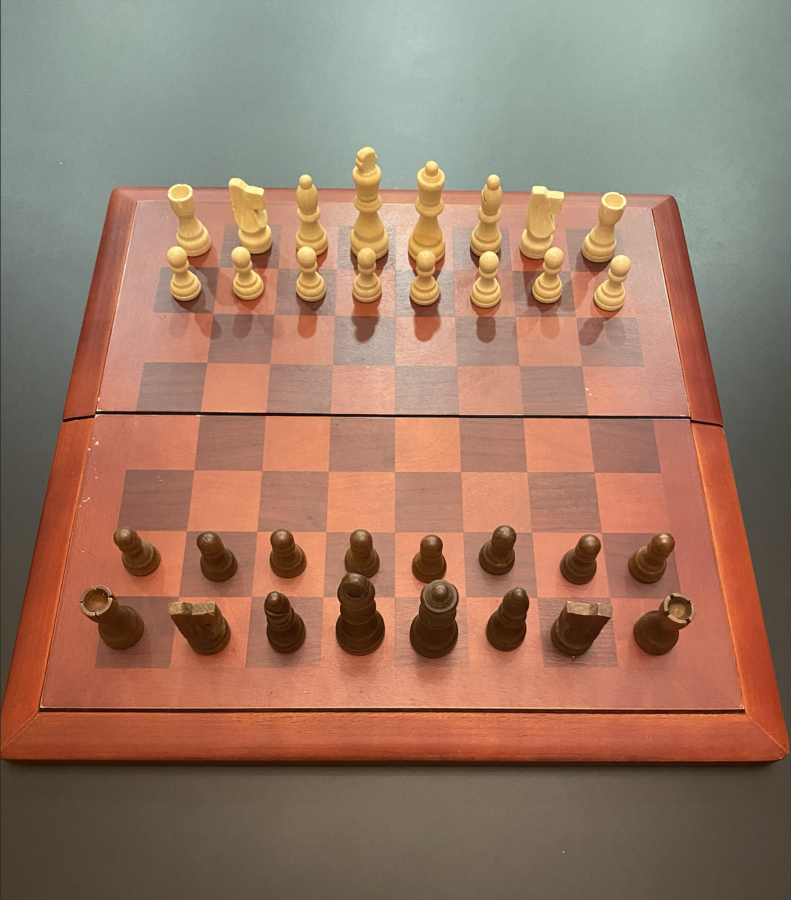Strive for Grandmaster: How and Why
Chess is a fun game to play with friends and even strangers with the mutual benefit of gaining important skills.
June 2, 2023
In a rush against the clock, chess is a mind-bending game that, although challenging, is beneficial. It requires players to think ahead and play out different situations in their heads. Although IQ is one factor in one’s ability to play chess, it is only one of many factors that are required when playing chess and will be developed with continuous playing.
Chess grandmasters are known as the most talented chess players in the world, those whose whole lives have been dedicated to mastering chess. Grandmaster is the highest title a chess player can earn aside from being World Champion, and it is not a title awarded easily. The title is awarded by FIDE (International Chess Federation) when a chess player earns a 2600-plus rating in a nine-round FIDE chess tournament against other professional chess players in various countries (chess.com). Currently, only under 2000 people have been given the title of Grandmaster in the world, and only 40 have been women.
So why strive to become better at chess or even play chess at all if it is so challenging to receive a title? Simply put, playing chess teaches important lessons and is healthy for the brain. Some basic skills that are improved by playing chess include creativity, memory, problem-solving, concentration, and planning. Furthermore, chess helps develop the ability to see another person’s perspective because it is an important skill to think about your opponent’s next moves. In the long run, playing chess has also been shown to help prevent Alzheimer’s: people over the age of 75 are less likely to develop dementia if they engage in brain-exercising activities like chess (New England Journal of Medicine). Also, more generally, chess is a game that can bring many different people together and teaches people how to win and lose. Holden Mohler (11), an avid chess player who has a chess.com rating of 1100, explains that he likes to play chess because “it is a very niche skill that not a lot of people have and to me, it’s just an interesting hobby that I find very fun.” Holden continues on to state how “it has benefited me a lot, at least in terms of the way I think. It takes a lot of strategy and planning to win, and learning how to play has taught me different ways to strategize on the spot.”
The first step to receiving all said benefits is to learn how to play. The main objective of chess is to put your opponent’s king in checkmate (when there are no legal moves for the king to escape check), but you can also win if your opponent forfeits the game. After learning the correct setup of the chess board, it is important to familiarize yourself with the game pieces. Starting off, the pawn moves one square straight ahead (has the option to move two squares ahead on the first move) and can capture pieces one square diagonally. Next, the knight moves in an ‘L-Shape,’ two squares in a straight direction and then one square perpendicular to that. The bishop moves any number of squares diagonally, the rook moves any number of squares horizontally or vertically, and the queen can move any number of squares horizontally, vertically, and diagonally. Last but not least, the King, the most vital piece in the game, can move one square in any direction, which is why the game requires the other pieces to protect the king.
After familiarizing yourself with how the game works and how each piece moves, you can improve your chess skills by practicing and learning strategies. Popular strategies are usually created by well-known and talented chess players and through the analysis of their games. Some frequently used strategies include Sicilian Defense, King’s Gambit, French Defense, English Opening, and more. Knowing these strategies could give you a leg up on your opponent or could prepare you for if your opponent uses a strategy on you.
Chess.com is a very popular site and app that is used around the world. Chess.com is a great resource to practice chess, play against your friends, play against a computer, play with a random opponent, or do chess puzzles. Not only does Chess.com give you a pretty accurate estimate of your chess-playing level, but it also helps you improve by giving you an analysis of the games you play. The analysis includes how good the moves you made were, where you made mistakes, and the best move you could have made in each situation.
Next time you have some free time, try picking up chess as a new hobby or continue playing to further develop your skills. However, it is important to be patient when learning and trying to improve at chess. Don’t forget that chess is a game that, although requires intense thinking, is meant to be fun.





































